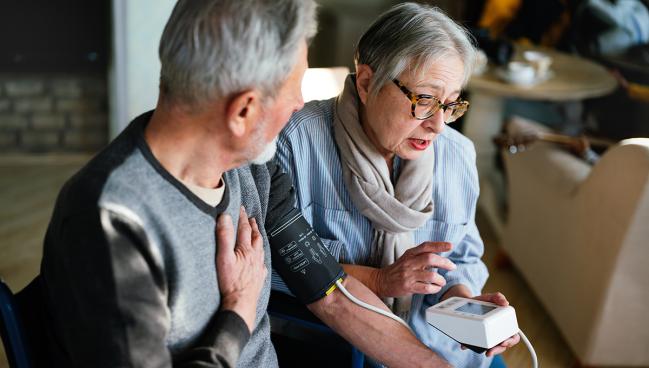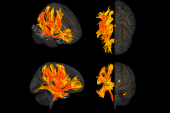Antihypertensives Linked to Lower Long-term Dementia Risk
Echoing earlier studies, real-world Italian data bolster the case for reducing blood pressure. But what’s actually driving the benefit?

Older adults, even those in their 80s, who take antihypertensive drugs are at lower risk of dementia, an Italian study confirms. The observational data can’t speak to mechanism, researchers cautioned, but do bolster the case for the link.
The study, by Federico Rea, PhD, Giovanni Corrao, PhD, and Giuseppe Mancia, MD (all from University of Milano-Bicocca, Milan, Italy), was published in the April 2, 2024, issue of the Journal of the American College of Cardiology.
Evidence, including from the SPRINT MIND trial, has continued to grow showing a connection between lower blood pressure and lower dementia risk. The mechanism isn’t clear, though prior research has identified specific areas of the brain that appear to be involved in cognitive impairment in the setting of high blood pressure.
Now, the prevailing opinion is that “indeed antihypertensive treatment can offer some benefit as far as the risk of dementia is concerned,” Mancia, the new paper’s senior author, told TCTMD. “This, of course, is in line with the fact that already many years ago epidemiologically it was found that if you have high blood pressure in middle age then the risk of having dementia in old age is greater.”
But on the whole these reports have been small, with relatively short follow-up and homogeneous populations, he noted. This study, therefore, adds perspective.
What type of drug patients take hasn’t yet been found to matter, he said. “What really matters is lowering your blood pressure per se,” a message that Mancia noted extends not only to cognitive function but also to endpoints like MI, stroke, and kidney disease. “This does not deny the possibility that some differences may exist between drugs,” he added, “but the real substantial benefit appears to come from the reduction in blood pressure, which is an important message to give to physicians. We’re not interested so much in how you do this, but you have to try to lower blood pressure.”
Importantly, “it’s never too late,” Mancia stressed.
What really matters is lowering your blood pressure. Giuseppe Mancia
For their nested case-control study, Rea and colleagues looked at a cohort of 215,547 patients from Lombardy, Italy, age 65 or older who started taking antihypertensive drugs between 2009 and 2012. Among them, 13,812 individuals (mean age 77.5 years; 60% female) were diagnosed with dementia or Alzheimer’s disease over an average follow-up period of 7.3 years. Each case was matched for age, sex, and clinical status with five controls who did receive a diagnosis.
Most patients (80%) started out on one drug, most often a renin-angiotensin-system blocker. When another drug was added, it typically was a diuretic agent.
The researchers calculated the level of exposure by looking at the proportion of days covered (PDC) over follow-up. Patients with very low exposure (PDC ≤ 25%) to antihypertensives served as the reference group. Higher exposures were linked, in a linear fashion, to progressively lower dementia risk. While the degree of benefit varied, the same overall patterns were seen irrespective of sex, in patients ages 85 and older, as well as in those considered frail, and when separately analyzing patients with dementia versus Alzheimer’s disease.
Decrease in Dementia Risk Based on Exposure to Antihypertensive Drugs
|
Very Low (PDC ≤ 25%) |
Low (PDC 26-50%) |
Intermediate (PDC 51-75%) |
High (PDC > 75%) |
|
Reference Group |
-2% |
-12% |
-24% |
Their results show that the “treatment-related benefit was not marginal,” the investigators say. Importantly, too, “the favorable effect of exposure to antihypertensive treatment in delaying the onset of dementia extended to a considerably more advanced age than that reported by previous studies.”
Although the findings are persuasive, the ways by which higher blood pressure leads to cognitive problems aren’t fully known, they acknowledge.
For dementia, there are some likely culprits, the authors observe. “This risk can be explained by the detrimental effect of blood pressure elevation on the structure of the brain (white matter lesions, microbleeding episodes, and lacunar infarcts) through remodeling of the small cerebral vessels, although more direct brain damage caused by the increased arterial stiffness and enhanced blood flow pulsatility associated with hypertension is probably also involved.”
Mancia raised the question: do the associations extend beyond dementia to apply to Alzheimer’s disease as well?
“We can imagine that the mechanism behind the protective effect of antihypertensive treatment is reduction in the risk of having microbleeds and microinfarctions in the brain,” which would thereby reduce the potential for brain damage, he explained. “But the mechanisms leading to Alzheimer’s are quite different: they may have a more specific cellular component.” Mancia said the reality is that for most patients, the etiology of cognitive problems is mixed: with a vascular component as well as Alzheimer’s disease.
Future studies should check to see what extent of blood pressure reduction, not just the extent of antihypertensive drugs taken, offers the most protection, he suggested. “Which are the target blood pressure values at which reduction of the risk of dementia is maximized?”
Clinton B. Wright, MD, and Marco Egle, PhD (both from National Institute of Neurological Disorders and Stroke, Bethesda, MD), writing in an accompanying editorial, agree that “as exciting as these results appear, questions remain.”
They call out the study’s lack of details on the proportion of patients who reached intended therapeutic targets. “Information on BP readings may particularly be important in older adults who more often show postural and other BP variations arising from age-related changes, including large artery stiffness and autonomic instability,” the editorialists write. “Furthermore, it is unclear to what extent adherence rates to hypertensive medication in older patients can be reliably quantified by the proportion of days covered by prescriptions.”
Caitlin E. Cox is Executive Editor of TCTMD and Associate Director, Editorial Content at the Cardiovascular Research Foundation. She produces the…
Read Full BioSources
Rea F, Corrao G, Mancia G. Risk of dementia during antihypertensive drug therapy in the elderly. J Am Coll Cardiol. 2024;83:1194-1203.
Wright CB, Egle M. Rethinking blood pressure treatment and dementia risk in older adults: is adherence the Holy Grail? _J Am Coll Cardiol. 2024;83:1204-1206.
Disclosures
- The study was supported by a grant from the Italian Ministry of Health.
- Corrao has received research support from the European Community, the Italian Medicines Agency, the Italian Ministry of Health, and the Italian Ministry of Education, University, and Research; has participated in various projects that were funded by Novartis, GSK, Roche, Amgen, Bristol Myers Squibb, and Servier; and has received honoraria from Roche as a member of its advisory board.
- Mancia has received honoraria for participation as speaker or chairman in national or international meetings from Bayer, Boehringer Ingelheim, CVRx, Daiichi Sankyo, Ferrer, Medtronic, Menarini Int, Merck, Novartis, Recordati, and Servier.
- Rea reports no relevant conflicts of interest.
- Wright has received royalties from Wolters Kluwer for dementia chapters in UpToDate.com.
- Egle was supported by the National Institute of Neurological Disorders and Stroke Intramural Research Program.





Comments